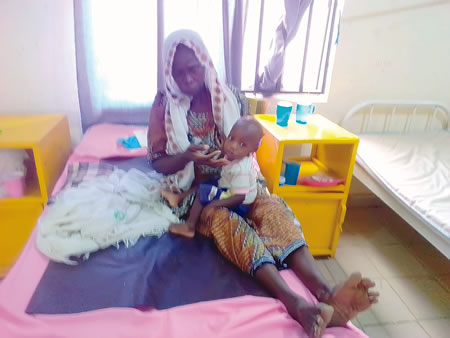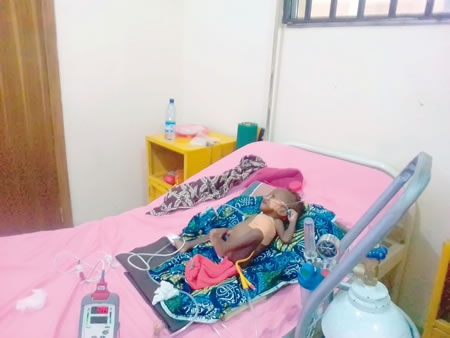
Numan-born Professor Jose Ambe is the head of Department of Pediatrics at the University of Maiduguri Teaching Hospital (UMTH). In his calling as a medical practitioner, sick tender kids who cannot express themselves have been blessed with speedy treatment in the North East region. At present, besides being the Head of Pediatric Unit of the UMTH, Professor Ambe works in conjunction with the Alliance for International Medical Aid (ALIMA) in Nigeria to reduce malnutrition in the region. And this is equally why he is worried that about the fact that about two per cent of malnourished kids in this country of over 180 million people are from the North East where he comes from.
Also working with him is Dr Baweye Barka from ALIMA, a Dakar-based non governmental medical agency and some other partners involved in fighting malnutrition headlong. Malnutrition has become a scourge in Borno, which is why the chairman, medical advisory committee of UMTH, Professor Bashir Tahir, equally agreed to support the new centre. But whether this sourge was caused by the lingering Boko Haram insurgency or not, is a subject to which further quality researches will be done by the proposed Institute of Child and Adolescent Medicine which will soon come on stream in UMTH.
ALIMA Centre inside the UMTH
When the Nigerian Tribune visited the ALIMA Centre recently, it was clear that the issue of malnutrition was as bad as insurgency. It became this bad because the central authorities in the country had never seen it as an emergency which is supposed to be given special attention from the primary to tertiary levels. Now that they are facing the reality, they have Alima and about six other non governmental agencies involved in its management. With Alima, located in the building of the former Department of Nuclear Medicine, every kid that comes into this facility must go through the “stabilisation process.”
The stabilisation centre is used to restore the kids from sub normal-body weight to at least a normal state when they come in as patients for the treatment of malnutrition. “This malnutrition programme is restricted to kids less than five years old. No matter how emaciated an adult is, he or she cannot be described as suffering from malnutrition the way these kids suffer and sometimes die before they get to us.

Adults may suffer from starvation and lose weight but it is only kids that can suffer from malnutrition,” said Dr Barka, who is the cordinator of ALIMA emergency response at the centre and working with Professor Ambe. The collaboration programme was actually started in June this year after the Minister of Health, Professor Isaac Adewole, had flagged off the nutritional health programme earlier in the state in conjunction with the state government and partners from all over the world. Over 200 adhoc staff were recruited to work in the three zones of Borno State to ensure that the problem of malnutrition stops being a killer of toddlers. At the usual monthly health partnership meeting at the Borno State Eye Clinic, it was mentioned that 22 non governmental organisations were involved in the nutritional programme which was flagged off by the minister. The result as at November ending meeting rated the food programme as having being boosted to about 70 per cent in the entire state. But does that mean that the mortality of kids between the ages of one and three will be stabilised?
Management process of the malnourished children
The entire recuperation programme for the malnourished children entails giving special energy paste to kids who have been badly affected. The paste, which is mixed with a special milk, is passed through the nose of the malnourished whose lives are being threatened for at least three days before the mouth procedure.
According to Professor Amber, “the joint venture between the UMTH and ALIMA is a dream come through” when the issue of malnutrition was taken to the front burner in Abuja where he presented a paper on the reality of this neglected scourge in the North East. In that meeting that trigered this development and research, “there were Professors Alhaji Arab, Adamu Rabasa and many other experts who agreed that it was time to start such a specialised centre for emergency and research services which had never been dreamt of in tropical sub Sahara Africa.”
ALIMA receives patients monthly from the Out Patient Department of this hospital which used to refer such cases to the Paediatric Unit for management by the inpatients Therapeutic Feeding Centre (ITFC). When they are brought into the place, they are first sent to the resuscitation room where the babies are brought up to the weight in concord with his or her age. All these are done before the “appetite test”. That also happens first before he or she is introduced to proper food diet regimes. The entire complex occupied by ALIMA has four doctors and three consultants headed by Professor Jose, who has spent all his years working and understanding the peculiar sounds and queries from babies who can never tell you what is wrong with them. ALIMA staff and general practitioner Dr Amina, who was on duty at the stabilisation centre told the Nigerian Tribune that she was enthusiastic that malnutrition would soon be a thing of the past. She sounded so enthusiastic doing what she was doing to save the lives of kids. She works in conjunction with Chief Matron, Amamase Theresa, who told the Nigerian Tribune that about 60 to 70 per cent of the kids rushed to them were from the Internally Displaced Persons (idps) camps in the North East. “Indeed, some of them are from the communities in Maiduguri while others were resident idps living among relations in the town,” said the matron while conducting the Nigerian Tribune around the beds of the kids.
Teething problems affecting the centre
The centre also involved in training and there are specified trainings by experts who are supposed to know about the scourge and to correct each case, sending the kids back to their normal and active life. Ambe says they had trained about 49 cases from June till date. It is expected that by the time the MOU signed with the ALIMA partners expires, the UMTH would have trained enough personnel to fill in the gap in the nutrition programme which, according to Professor Ambe, had come to stay. It will operate in conjunction with the proposed Department of “Human Nutrition and Diatetics” which will be a branch of the entire adolescent medical centre. Professor Ambe also said that the kids in the department used to come down with lots of medical complications coupled with the fact that some doctors were used to old protocols of handling this kind of problems. He said,that the research in the centre would give rise to new ways of doing things and offering solutions.
The proposed Institute of Child and Adolescent Medicine
Ambe told the Nigerian Tribune that the adolescents had been neglected in this country for a long time, saying further that children and adults were taken care of but the adolescents were totally neglected. “The Pediatric Association has advised us to go beyond 15 to 18 years so that we can pay special attention to their needs. These people do not fit into the children group neither are they adults. So by the time we start ours, we would have been able to set the right professional template to handle them.”. He said that the institution had been on the drawing board for almost 15 years and the proposal was ready for submission to the minister, Professor Adewole for final approval for take off. On what would be very special about the centre, he said that the psychosocial aspect would be fully developed so that the job would be easy for adolescent who are very difficult group of people. For Dr Baweye Barka, Alima is like any other non governmental organisation, created in 2009 by the French. It got a work permit and came into town in July 2016 and had been operating in the last eight months in 2017 in Maiduguri. Apart from malnutrition, the body is also into research. Alima is basically into treatment of malnutrition, attending to emergencies and reduction of infants and child mortality. It is hoped that before they round off from the region, lots of improvements would have been made in the fight against malnutrition.






